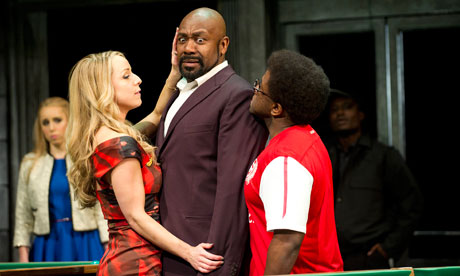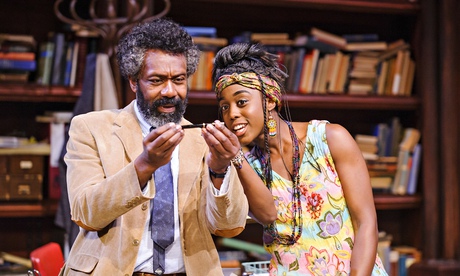It has wags and it has Wags. It pictures the city as a place in which people go nuts; a street band weaves in and out singing "Goin' Out of My Head", "Paranoid" and "Crazy" in Romanian. It stars Lenny Henry, pulling off his second Shakespearean role with looks of thickening bewilderment and slowly dawning illumination. Henry is often nimble and quick but sometimes he looks as if he's only half there – exactly what is required in a play that hinges on the rending apart of identical twins.
Dominic Cooke's production of The Comedy of Errors is Henry's National Theatre debut: it is only a couple of years ago that, having gone on radio to say he didn't get the point of Shakespeare, he found himself starring in Othello. More significantly for the London stage, this is Cooke's first production at the National, and may be a moment that helps determine his future. He has triumphed as artistic director of the Royal Court: now, directing on a bigger stage, he can't help but put himself in the running for the directorship of the National after Nicholas Hytner.
He would, no question, be high on any list of successors. Still, this clamorous, lively modern-dress production is not his apogee. The invention is tremendous but too reliant on gizmos, business and big mechanisms. Bunny Christie's design of towering skeletal buildings festooned with iron walkways, supplies an exciting wreck scene as people at all levels howl and clang and lower babies from precipitous heights. The backstory – delivered in one of Shakespeare's panic-inducing expository speeches – is acted out in mime, with the mighty set splitting in two as the twins are severed from each other and doomed to end up in the same city, constantly mistaken for the other.
Cooke's substantial achievement is to orchestrate a gradually mounting mania, through slapstick and bawdy to desperation. He introduces a cafe scene with custard pies, a farting competition through an intercom, and a Keystone Kops chase with pedal scooters, straitjackets and spinning scenery. A real London ambulance gets that special round of applause that is reserved for vehicles on stage: even a bicycle will raise an appreciative murmur in the stalls.
All this is buoyant. Still the more intricate invention is elsewhere. In Henry and his twin, Chris Jarman; in two beguiling Dromios, Lucian Msamati and Daniel Poyser. And in the Wags: Claudie Blakley and Michelle Terry teetering on high heels, wearing frocks like bum bandages. Blakley has a terrific tour de force when she slithers from a pool table to paw her man, and another when, lying on a massage table, she keeps springing up to deliver her crossness. Terry, stiff-limbed and poppy-eyed, speaks the verse with a bolshie naturalness: she doesn't embrace it but scowls at it, as if its rhythms were just tripping her into being so funny. These two wire you into the speech of the play in an enduring fashion.
How could the theatre that produced the gorgeous Matilda – sharply worded, precisely drilled and, in Bertie Carvel, featuring one of the best performances of the year – think that The Heart of Robin Hood was adequate as an end of year show?
David Farr's play, directed by Gísli Orn Gardarsson, is jerkins and big boots with spray-on movement theatre. Five years ago Gardarsson, whose gymnastic productions regularly send casts springing over the heads of the audience or walking upside down, worked with Farr to truly disconcerting effect on a version of Kafka's Metamorphosis, but here a few notions (each jolly enough at first sight) are used again and again. Börkur Jonsson's design spreads leafy boughs under the rafters and dangles from them (this is nice) musicians who are so high up that at first it's hard to believe they aren't puppets.
There is a sward that uncurls like a giant scoop towards the audience and down which characters are always rolling: it's not entirely clear why. There is a pool into which people are forever popping: following the aqueous acrobatics at the Bush last week, it seems that water is this season's compulsory accessory. There are an enormous number of unconvincing sword fights whose lack of real ferocity is only partly disguised by vigorous drumming and roaring and by dimmed lights.
No amount of capering can cover up skinny dialogue and a plot which strains too hard to be hip. The Robin Hood story is given a feminist twist: Iris Roberts's merry Maid Marion is a toughie aristo who likes to fight; James McArdle's blokey Robin learns from her to turn from thuggery to caring. Talk about wars against the infidel is given an emphatically modern tilt. Shakespearean references are nudged and winked at: we're in a wood with a girl dressed as a boy courting a man; we're in a kingdom where an organ (not a vile jelly but a writhing eel-like tongue) can be flung out of someone's face. Some of this is panto; some of it is just pants.
One episode shows the potential (much of it Icelandic) behind this too strenuous show. In the closing moments circus skills and a hint of Scandinavia come together to create something extraordinary. Characters, haloed with light, approach the stage; lovers swarm up a rope and then twist together in the air like a Christmas bauble.
Goodbye Barcelona, fervently sung and warmly felt, pays tribute to the International Brigades who went from Britain to fight in the Spanish civil war. Political and personal romance march shoulder to shoulder in Judith Johnson's book and in the music and lyrics of KS Lewkowicz. A teenager from Stepney, blooded in the battle of Cable Street, goes out to join the struggle and loses his heart to a young and suffering Republican. His mother goes to find him, and also falls in love. La Pasionaria issues clarion calls. Fists are clenched as the "Internationale" is sung in front of a blood-spattered curtain. There is the beginning of a good patter song playing on the factionalism of the Republican fighters, and a subtle performance from Mark Meadows as a cynical but stalwart soldier, but this is the draft of a musical rather than the full thing.











